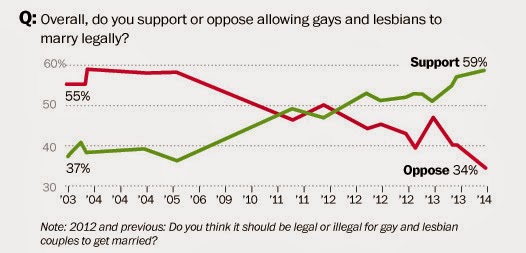 |
| h/t to the Millennial Pastor for the great image (& responses) |
On Monday, World Vision announced in Christianity Today that it was changing its hiring policy so that gay Christians in legal marriages could be hired. Rich Stearns, president of World Vision, explained the policy change this way:
"It's easy to read a lot more into this decision than is really there," he said. "This is not an endorsement of same-sex marriage. We have decided we are not going to get into that debate. Nor is this a rejection of traditional marriage, which we affirm and support." "We're not caving to some kind of pressure. We're not on some slippery slope. There is no lawsuit threatening us. There is no employee group lobbying us," said Stearns. "This is not us compromising. It is us deferring to the authority of churches and denominations on theological issues. We're an operational arm of the global church, we're not a theological arm of the church."The shit immediately hit the fan with close to 5,000 people canceling their sponsorships of children. In less than 48 hours, Stearns announced that the board reversed the decision, saying it was a mistake.
"We made certainly in retrospect was a bad decision, but we did it with the right motivations. We weren’t trying to harm, or trying to find revenue, we weren’t doing it for wrong motives. We were trying to find some kind of solution to a divisive issue that would create some space of togetherness around differences within the church. Our regret is that we caused more division instead of finding a place of more unity."So by Wednesday, I had a fair number of thoughts going through my head. Let me see if I can set them out in any sort of coherent order.
First of all, I'm hugely disappointed by how this whole thing played out. And although I'm upset at those who decided to withdraw their sponsorship of children, I have to admit I understand it. I have not been a financial supporter of World Vision in part because of its conservative Christian background (not the only reason, but one of them). So I'm certainly in the same boat as people who don't want to support an organization that they think represents values counter to their own.
I'm much more disappointed with World Vision, for a few reasons:
- They (apparently) didn't anticipate this. Really? Knowing the political climate we live in, knowing the reactive nature of our current Christian culture, knowing that homosexuality is THE hot button topic...they hadn't thought through the plan?
- They didn't give this any time. Rachel Held Evans had begun rallying the troops to solicit new donors. I suspect many other church leaders would have done the same. I'd come home on Tuesday, after learning about the reaction, planning to donate to World Vision as a show of support for this change, knowing they were getting a beating. But they reversed the decision so quickly, I hadn't gotten to it yet.
- It seems tremendously short-sighted. They said they weren't trying to find revenue, and that may be true, but I think they lost a great deal of revenue in the long run by the reversal. Look at these charts, people! Do you see which way these lines are trending?
- It's inconsistent. Of course, if opposition to the marriage of same-sex couples truly were one of the fundamental principles under which World Vision operates, then looking at the approval rates would be irrelevant. However, one post I read this week noted that World Vision Canada has had a non-discriminatory hiring policy for over 15 years. Which leads me to believe
- This is a failure of leadership, not a principled decision. Was it based on the financials? It certainly could be. Their latest 990 (financial reporting) shows that expenses were higher than income in 2011 and 2012, at an increasing rate, so there may be serious financial pressures at work. But I am reminded of Friedman's book A Failure of Nerve, which explains that leadership means holding fast in the face of conflict, rather than immediately reacting to loud and negative voices.
I wish them the best, but I continue to believe this was a huge mistake.
***
FWIW, here are some of the international aid organizations to which I contribute, in case you're looking for other organizations to support:
Against Malaria Foundation: www.againstmalaria.com
CA Bikes: cabikes.org
Evidence Action: www.evidenceaction.org
Kiva: www.kiva.org
Partners in Health: www.pih.org







